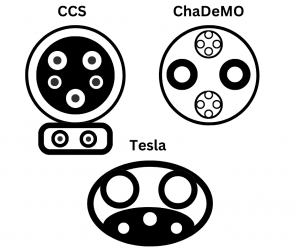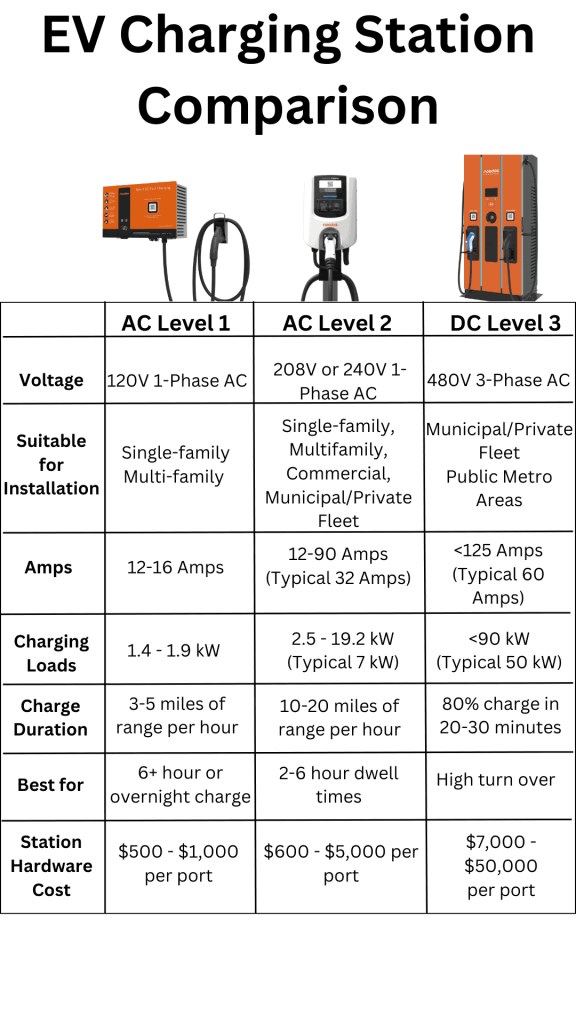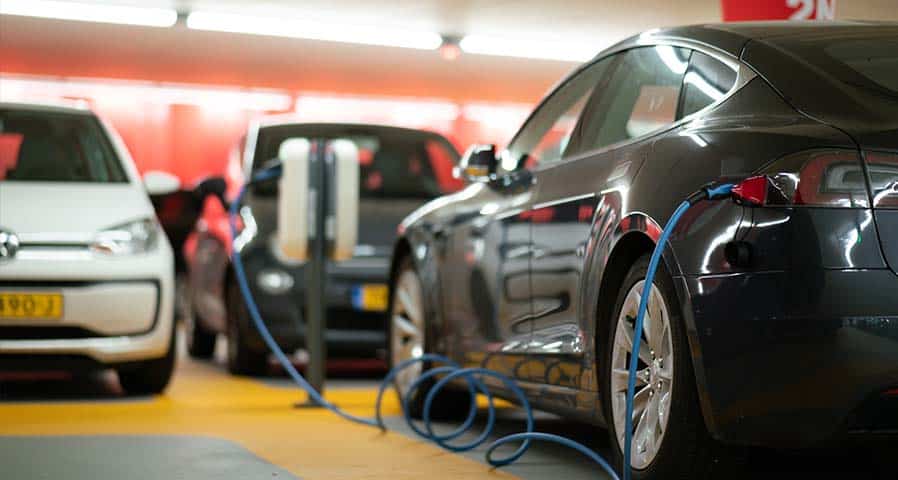BEV: Battery Electric Vehicles (BEVs) operate exclusively on electricity stored in batteries and only have an electric motor.
Direct Current Fast Charging (DCFC): Uses a 480V/3-Phase alternating current (AC) electricity connection. It’s the fastest charging option, often found along highways. Fast charging stations come at a higher cost for equipment and the electricity necessary to support the chargers.
Electrical Connectors for DCFC:
There are three different types of DCFC connectors (plugs) used by EV drivers in the United States: CHAdeMO, SAE Combined Charging System (CCS), and Tesla.
- CHAdeMO is compatible with Japanese EV models including Nissan and Mitsubishi and older Kia, Honda, and Hyundai models.
- Other automotive manufacturers use a CCs connector. However, most new DCFC stations come equipped with both CCS and CHAdeMO plugs.
- The Tesla connector is proprietary and only compatible with Tesla vehicles.

Definitions and Terminology
Electric Vehicle (EV): Any licensed and registered on-road vehicle that is powered or partially powered by electricity using an onboard battery.
Electric Vehicle Energy Management System (EVEMS): References how the EV controls the process of connecting, disconnecting, increasing, or reducing electric power from the communications equipment, monitor, timer, controller, or another applicable device.
Electric Vehicle Supply/Service Equipment or (EVSE): The equipment includes cables, cords, conductors, connectors, couplers, enclosures, attachment plugs, power outlets, power electronics, transformer, switchgear, switches and controls, network interfaces, point-of-sale equipment and other apparatus that supplies energy from the charging station to the EV.
EVSE is synonymous with “electric vehicle charging station.
Level 1 (L1): Level 1 charging is slower than other stations, however, it’s often ideal for overnight charging at home. Plug-in hybrids and BEVs often use Level 1 chargers. The units add around 3-5 miles per hour of charging.
Level 2 (L2): Level 2 charging is faster, providing a charging rate of 12-30 miles per hour of charging. It requires a 208V or 240V with a 1-Phase AC outlet. Level 2 chargers are appropriate for home use and businesses where visitors park their vehicles for an extended amount of time.
Level 3 (L3): Level 3 fast chargers allow for the fastest charging capability on the market. A DC charger converts AC power to DC within the charging station and then delivers the DC power directly to the battery. This is why a DC charger offers the fastest charging speeds.
Make-Ready: Refers to the process of pre-wiring the electrical infrastructure for additional charging stations in the future. The process includes expenses related to service panels, junction boxes, conduits, wiring, and other components necessary to support EV charging.
Multi-Unit Dwelling (MUD) refers to any type of multi-family residence with a minimum of five units. For example, apartments, condominiums, and townhouses.
PEV: Plug-in electric vehicle (PEV) refers to any vehicle that runs on electricity. These vehicles include battery-operated and plug-in hybrid vehicles.
PHEV: Plug-in hybrid electric vehicles use two propulsion systems. One is a rechargeable battery. The other is a gas-powered motor.
Port: A port is a connection from the charging station to the EV. Some charging stations come with multiple ports, while others have one. Charging stations with multiple connectors can reduce charging times when more than one EV is connected.
Private EVSE: Access to the charger is restricted to residents or employees, depending on its location.
Publicly accessible EVSE: EV chargers are accessible to the public. Often found in public parking lots and garages, on-street parking, shopping center parking, and non-reserved parking in multi-family parking lots.
SAE J1772 or J1772: It’s the EV connector established by SAE International. The connector is found in Level 1 and Level 2 charging stations.
SAE J1772 CCS or “combo connector”: This connector allows for DC fast charging.

EV Charging Stations form Apogee Charging Solutions
Now that you know a little more about EV chargers and its terminology, talk to one of our experts to help you select the right one. Call 484-816-2076, email [email protected], or you can schedule a call that fits your needs by clicking the button below.








0 Comments